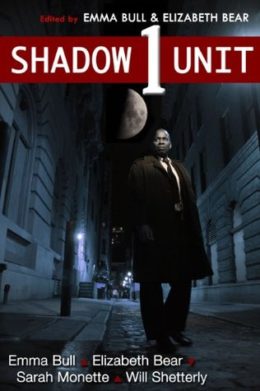Shadow Unit is the best TV show never filmed. If it had been filmed, it would’ve been pitched as “Criminal Minds meets The X-Files.” The Anomalous Crimes Task Force investigates the aftermath when the little-understood “anomaly” turns ordinary humans into (magically? psychically?) empowered monsters. Some members of the ACTF—the WTF if you’re feeling affectionate—are at risk of becoming monsters themselves.
Technically speaking, Shadow Unit is a now-complete online hypertext serial, written by some of the best authors in the business. Elizabeth Bear, Emma Bull, Amanda Downum, and Sarah Monette are at the top of the credits, and brought in several impressive guest writers along the way. There are four seasons of 8 to 13 episodes, each episode a novella broken down into a teaser and three acts. There are Easter eggs—click on the right word and you’ll find a bonus scene with fun bits of character development and occasional foreshadowing of massive plot points. The characters had blogs on a separate platform (LiveJournals, if anyone remembers those). The blogs came out in real time, while episodes were usually released a few weeks after they were set, so posts might drop oblique references to events you’d only learn about later. After one major reveal, several months’ worth of private posts suddenly became visible, shedding new light on the events leading up to it.
As a writer, I’m thrilled by the way Shadow Unit leverages the strengths of every form it claims. In the age of the preeminent screen we’re often tempted to write “cinematically.” Swoop the camera across vivid visual details, zoom in close on one character at a time. Show personality through action. Shadow Unit cuts through these obvious filmic tools to draw on the power of episodes. Like the best modern TV shows, it builds deep continuity across semi-standalone stories, giving each member of an ensemble the chance to shine (and suffer) in their own spotlight. It builds expectations through repeating patterns, then shatters them at crucial moments.
At the same time, Shadow Unit takes full advantage of the fact that it’s made of words. You can do things in prose that are close to impossible on screen. Smells, tastes, intimate proprioception. We get inside the characters’ heads, down in the emotional swamps that good behavioral profilers never let show on the surface. The blogs take this even further, epistolary revelations unconstrained by the heat of the plot.
Rereading in preparation for this post (I meant to read the first episode and am now most of the way through season one) I found a perfect sentence that encapsulates this:
The smell of dry-erase marker always made her think of murder and frustration.
That’s Special Agent Nicki Lau, the team’s public liaison, laying out case details on the white board. That scene’s been filmed a thousand times in police procedurals, but here’s the Proust effect of being in the room, of having been in that room dozens of times before and knowing you’ll be there again same time next week. Experience shapes each member of the team—the characterization is deep in the sense that every perception, every gesture, goes all the way back, all the way down.
Shadow Unit explores the bounds of form and medium, playing with what each is capable of. I would have loved to see it on a real screen—and at the same time I wouldn’t, because it does things that TV is technically capable of, but rarely does because it isn’t fully creator-controlled. For one thing, it’s “filmed” where it’s set. I moved to DC about halfway through the show’s run, and I’ve eaten at some of the team’s favorite restaurants. I can point to exactly the part of Silver Spring where Falkner lives, and side-eye Brady’s choice to live in Woodbridge. (Closeted, much?) I’ve given money to the domestic violence shelter where one of the characters used to volunteer, at a time and for reasons that would constitute a massive spoiler.
Shadow Unit is also diverse as hell in exactly the way American TV never is. If you imagine the group shot from an ensemble show, any ensemble show, you know what you’ll see. One person of color. One gay guy, if they’re feeling edgy. Either one woman, or a slight minority of women. I just counted, and the Shadow Unit main cast is evenly split by gender, and half people of color. Falkner is a Jewish woman in her 40s, which let me tell you how often that happens on cable networks. Any narrative where you don’t wonder about the unspoken apocalyptic plague that killed off 90% of women is a good one.
Almost ten years after “Breathe” first “aired”, it’d be about time for an anniversary DVD and a few retrospective cast interviews. But since I can’t have those, I’ll still happily settle into my binge re-reading marathon, and appreciate all over again how good the TV shows must be in the next dimension over.
Ruthanna Emrys’s neo-Lovecraftian stories “The Litany of Earth” and “Those Who Watch” are available on Tor.com, along with the distinctly non-Lovecraftian “Seven Commentaries on an Imperfect Land” and “The Deepest Rift.” Winter Tide, a novel continuing Aphra Marsh’s story from “Litany,” is available from Tor.com Publishing. Ruthanna can frequently be found online on Twitter and her blog, and offline in a mysterious manor house with her large, chaotic household—mostly mammalian—outside Washington DC.










